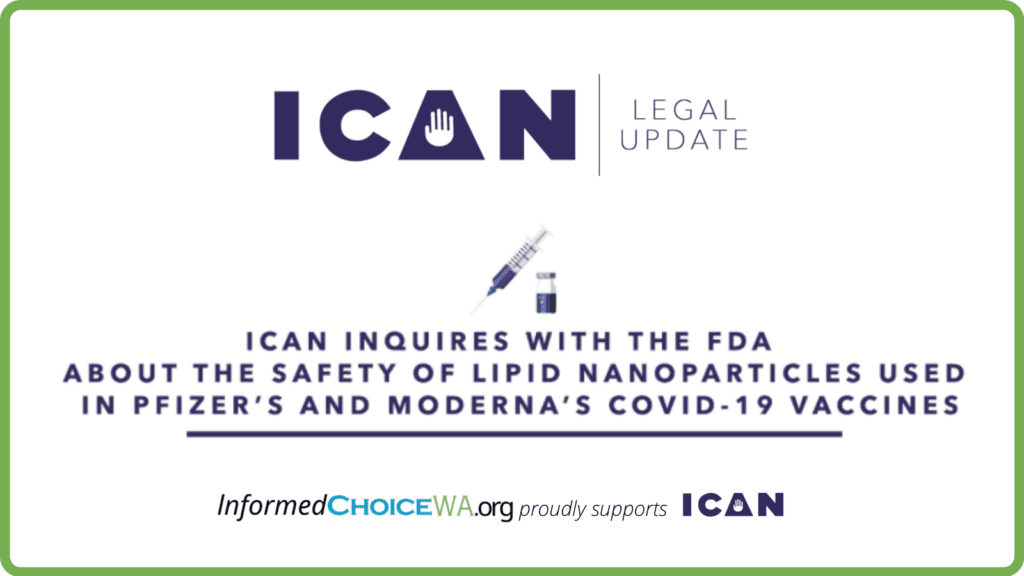Important news from the Informed Consent Action Network (ICAN)
| ICAN, through its attorneys, has once again written to Dr. Peter Marks, Director of the FDA’s Center for Biologics Evaluation and Research, to demand a response to the question of whether or not lipid nanoparticles used in both of the currently authorized COVID-19 vaccines are safe. ICAN is aware that both Pfizer and Moderna have used lipid nanoparticles (“LNPs”) in their vaccines – LNPs are what the manufacturers use to surround the RNA so that it does not fall apart when injected and before reaching its target cells. Some have compared these LNPs to a fatty envelope or a delivery vehicle to get the mRNA into the human body in one piece. A concern arose when ICAN was alerted to a study published in 2018 titled Lipid Nanoparticles: A Novel Approach for Brain Targeting. The study states: “…lipid nanoparticles are taken up readily by the brain because of their lipophilic nature. The bioacceptable and biodegradable nature of lipid nanoparticles makes them…suited for brain targeting.” The article also states, “these nanostructures need to be investigated intensively to successfully reach the clinical trials stage.” ICAN wants to fully understand whether the evidence that these LNPs are easily taken up and end up in the brain is a safety concern with these two particular vaccines. ICAN, through its attorneys, led by Aaron Siri, has therefore sent a letter to Dr. Peter Marks, the Director of the Food and Drug Administrations’ Center for Biologics Evaluation and Research. If you recall from previous legal updates, Dr. Marks has referred to himself as “the FDA point person on COVID-19 vaccines” and has assured Americans that the FDA “will make sure they’re safe and effective.” ICAN also pointed out to Dr. Marks that there appears to be support for the proposition that the body may react strongly to a second dose of the LNPs. Stated differently, the body is primed to have an immune reaction to the LNPs with the first dose. As explained by Johns Hopkins, “Side effects were more frequent after the second dose in the vaccine trials.” Another article, titled Exogenous nanoparticles and endogenous crystalline molecules as danger signals for the NLRP3 inflammasomes, supports that the increasingly inflammatory side effects observed in those who received the vaccine in Pfizer’s and Moderna’s clinical trials are attributable to the LNPs and that these side effects get worse with repeated injection. We have seen this increased “reactogenicity” clearly in the data from both Pfizer’s and Moderna’s COVID-19 clinical trials. ICAN continues to ask the hard questions of Dr. Marks and others: If LNPs from the vaccine, which contain mRNA, are entering brain tissue, and an immune reaction is occurring during the second dose to these LNPs, does this pose a safety concern for vaccine recipients? ICAN asked Dr. Marks to consider the question posed and provide support for the substance of any response he provides. ICAN will closely review any response from Dr. Marks given his promise that he and the FDA “uphold globally respected standards for product quality, safety, and efficacy” and his statement that he would resign if “something that was unsafe or ineffective [ ] was being put through.” As always, ICAN offered to provide any additional information or to meet with Dr. Marks to discuss this issue. |
| Stand for vaccine truth and help ICAN keep winning with your tax-deductible gift of $20, $30, $50, $100, or more today! |
| SUPPORT ICAN TODAY |

